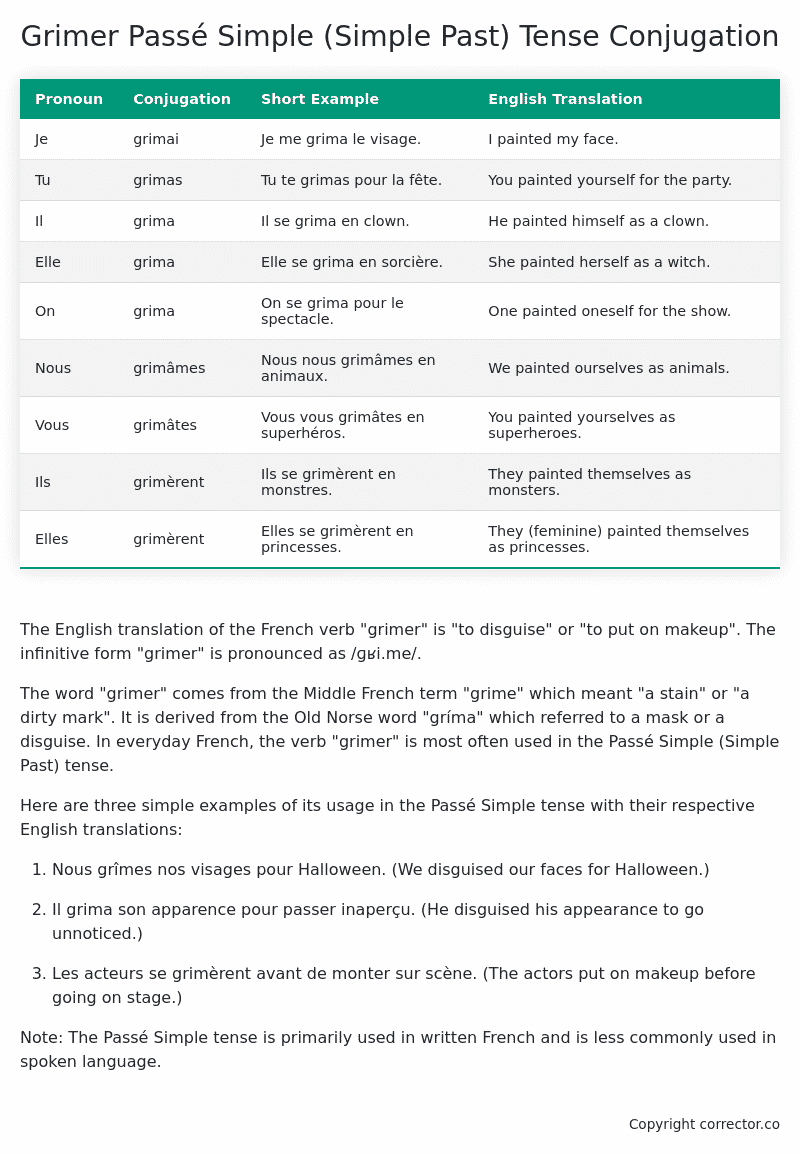Passé Simple (Simple Past) Tense Conjugation of the French Verb grimer
Introduction to the verb grimer
The English translation of the French verb “grimer” is “to disguise” or “to put on makeup”. The infinitive form “grimer” is pronounced as /ɡʁi.me/.
The word “grimer” comes from the Middle French term “grime” which meant “a stain” or “a dirty mark”. It is derived from the Old Norse word “gríma” which referred to a mask or a disguise. In everyday French, the verb “grimer” is most often used in the Passé Simple (Simple Past) tense.
Here are three simple examples of its usage in the Passé Simple tense with their respective English translations:
-
Nous grîmes nos visages pour Halloween.
(We disguised our faces for Halloween.) -
Il grima son apparence pour passer inaperçu.
(He disguised his appearance to go unnoticed.) -
Les acteurs se grimèrent avant de monter sur scène.
(The actors put on makeup before going on stage.)
Note: The Passé Simple tense is primarily used in written French and is less commonly used in spoken language.
Table of the Passé Simple (Simple Past) Tense Conjugation of grimer
| Pronoun | Conjugation | Short Example | English Translation |
|---|---|---|---|
| Je | grimai | Je me grima le visage. | I painted my face. |
| Tu | grimas | Tu te grimas pour la fête. | You painted yourself for the party. |
| Il | grima | Il se grima en clown. | He painted himself as a clown. |
| Elle | grima | Elle se grima en sorcière. | She painted herself as a witch. |
| On | grima | On se grima pour le spectacle. | One painted oneself for the show. |
| Nous | grimâmes | Nous nous grimâmes en animaux. | We painted ourselves as animals. |
| Vous | grimâtes | Vous vous grimâtes en superhéros. | You painted yourselves as superheroes. |
| Ils | grimèrent | Ils se grimèrent en monstres. | They painted themselves as monsters. |
| Elles | grimèrent | Elles se grimèrent en princesses. | They (feminine) painted themselves as princesses. |
Other Conjugations for Grimer.
Le Present (Present Tense) Conjugation of the French Verb grimer
Imparfait (Imperfect) Tense Conjugation of the French Verb grimer
Passé Simple (Simple Past) Tense Conjugation of the French Verb grimer (You’re reading it right now!)
Passé Composé (Present Perfect) Tense Conjugation of the French Verb grimer
Futur Simple (Simple Future) Tense Conjugation of the French Verb grimer
Futur Proche (Near Future) Tense Conjugation of the French Verb grimer
Plus-que-parfait (Pluperfect) Tense Conjugation of the French Verb grimer
Passé Antérieur (Past Anterior) Tense Conjugation of the French Verb grimer
Futur Antérieur (Future Anterior) Tense Conjugation of the French Verb grimer
Subjonctif Présent (Subjunctive Present) Tense Conjugation of the French Verb grimer
Subjonctif Passé (Subjunctive Past) Tense Conjugation of the French Verb grimer
Subjonctif Imparfait (Subjunctive Imperfect) Tense Conjugation of the French Verb grimer
Subjonctif Plus-que-parfait (Subjunctive Pluperfect) Tense Conjugation of the French Verb grimer
Conditionnel Présent (Conditional Present) Tense Conjugation of the French Verb grimer
Conditionnel Passé (Conditional Past) Tense Conjugation of the French Verb grimer
Conditionnel Passé II (Conditional Past II) Tense Conjugation of the French Verb grimer
L’impératif Présent (Imperative Present) Tense Conjugation of the French Verb grimer
L’impératif Passé (Imperative Past) Tense Conjugation of the French Verb grimer
L’infinitif Présent (Infinitive Present) Tense Conjugation of the French Verb grimer
L’infinitif Passé (Infinitive Past) Tense Conjugation of the French Verb grimer
Le Participe Présent (Present Participle) Tense Conjugation of the French Verb grimer
Le Participe Passé (Past Participle) Tense Conjugation of the French Verb grimer
Struggling with French verbs or the language in general? Why not use our free French Grammar Checker – no registration required!
Get a FREE Download Study Sheet of this Conjugation 🔥
Simply right click the image below, click “save image” and get your free reference for the grimer Passé Simple tense conjugation!

Grimer – About the French Passé Simple (Simple Past) Tense
Formation
Usage
Narration
Historical Context
Interactions with other tenses
Passé Composé
Imparfait
Conditional and Subjunctive
Summary
I hope you enjoyed this article on the verb grimer. Still in a learning mood? Check out another TOTALLY random French verb conjugation!


